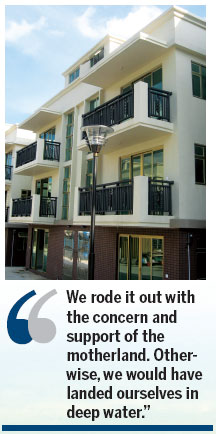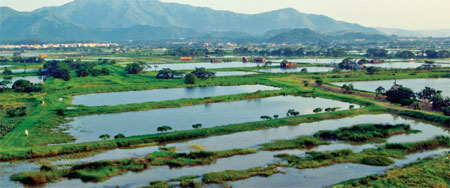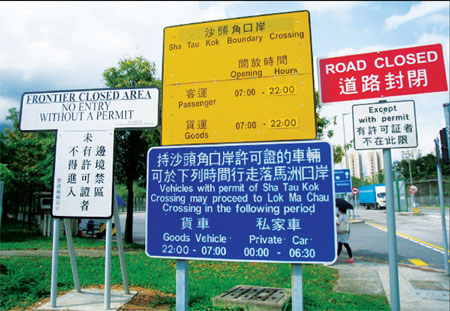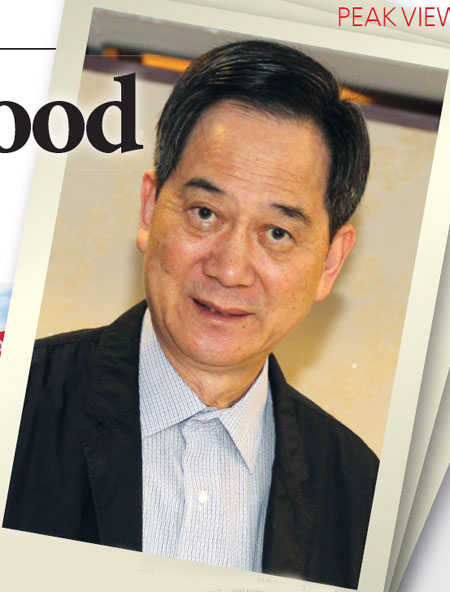Bound in blood
Updated: 2013-07-05 07:20
By SL Luo(HK Edition)
|
|||||||||
|
The Frontier Closed Area offers enormous potential for diversified business operations as it gradually opens up. |
|
Kuk leader Daniel Lam Wai-keung seeks understanding from outsiders that indigenous people are not getting special treatment from the government, urging them to play a part in the development of the New Territories. ParkerZheng / China Daily |

The indigenous community wants to benefit from the opening of the Frontier Closed Area. But Heung Yee Kuk Vice-Chairman Daniel Lam tells SL Luo the indigenous people will not sacrifice their land rights and traditions.
Heung Yee Kuk leader, Daniel Lam Wai-keung, quotes a common Chinese adage as he reminisces over the past three decades of the organization's unremitting journey - casting off its shell as a rural, farmland entity to become a full-fledged political powerhouse.
"We've gone through the mill, a life that's been sour, sweet, bitter and hot," he says.
It's been like playing a "one-man band" throughout, constant fighting, occasionally drawing some consonance from outsiders in shared perspectives, says Lam, a veteran Hong Kong politician with almost 30 years of unbroken service to his kinfolk - the indigenous inhabitants of the New Territories.
Lam calls himself a "kinsman fighter," following a principle that has been the hallmark of his people for generations. "We have no choice either as a councilor or a legislator. Everything's for the people. It has to be the best. If we can't succeed, we will have failed in our mission to be responsible and successful representatives of our people," he says.
The Kuk, an organization founded on more than a century of ancestral kinship in the New Territories, has stood up on every issue close to the hearts of indigenous villagers, Lam says. "We take extreme pride in our standing, starting from colonial Hong Kong and our glorious past."
Memorable achievement
For the Kuk itself, Lam argues, the biggest and most memorable achievement was having the traditional rights and privileges of the indigenous population enshrined in the Basic Law, and fully protected by the HKSAR government.
To date, the Kuk remains the only political group in Hong Kong accorded such honor. "It was the most difficult fight and we won. All the other contexts were small potatoes."
The New Territories accounts for some 90 percent of Hong Kong's entire land mass, and the rural population is almost equal to that of the urban center as new towns mushroom - Tsuen Wan, Tuen Mun, Tai Po and Yuen Long. The city's population, on the other hand, is projected to hit 8.7 million by 2031.
In Lam's view, the population of the New Territories could eventually surpass that of the urban areas, as more people move in, with the gradual opening up of the Frontier Closed Area (FCA). But, the New Territories, he assures, is not under the sole proprietorship of of the indigenous people.
He would like the vast economic development potential shared by all Hong Kong people, but with due respect for the traditional rights and customs of indigenous villagers. "We welcome outsiders to come and live with us, as long as our way of life remains intact and is respected - something which we're not prepared to sacrifice an inch in the name of economic advancement."
The first 740 hectares of the historic closed area bordering Shenzhen were being opened to public access, waiving the need for outsiders to obtain special permits to enter. But Lam thinks development has been slow. "I've not seen anything dramatic happening since the FCA opened up last year. It hasn't gone as fast as it should have. It's not been up to our expectations."
He calls for a vast, comprehensive commercial complex inside the FCA to embellish the already close trade and economic links between the HKSAR and the mainland. "Mainland visitors may not need to go to Central or Tsim Sha Tsui in future to shop. Just do it here."
However, Lam warns the government to be cautious, urging that a balance has to be struck. "Under 'One Country,Two Systems', we're all Chinese. Security areas must be reduced to the minimum and more land released for economic development. But, it has to be such that it fits in with the needs of the local population. The villagers' concern over the affects on their livelihood and way of life must be addressed," he argues.
In his view, there are bound to be positive and negative effects from economic development, but the government's views must be crystal clear, taking fully the public's perceptions into consideration. "While Hong Kong is a free market, we don't have enough land for Hong Kong people and we must be prudent with the use of precious land," he says.
Lam today remains one of the two vice-chairmen of the Heung Yee Kuk, having given up most of his political mantle to make way for the next generation.
He is still one of the city's longest-serving rural political leaders, chairing the Peng Chau Rural Committee for 29 years from 1982 to 2011 and the Islands District Council for 26 years from 1985 to 2011. He also headed the Regional Council from 1995 to 1997 and was often referred to then as the "Mayor of the New Territories". Lam also served two terms as the Kuk's functional constituency representative in the Legislative Council.
In rural development, he claims, the government has overlooked villages. "The development gap between the city and the villages is still big. We need more resources for developing the New Territories to take good care of local people."
In his interview with China Daily, Lam also shared his thoughts on important local issues, some of which, he claims, have "blown the lid off things."
Village elections, he says, serve as a good model for rural people, as they choose their representatives to look after their interests. He calls the elections, held every four years, "fair and just," representing indigenous people, who like indigenous peoples all over the world, want their traditional rights and privileges protected.
Small voice
Lam, who had spent much of his youth studying in the United States, says that in colonial Hong Kong, indigenous people had only a small voice in local affairs, but now, after the handover, "we are the masters of this place."
As a result, he argues, Hong Kong people now have too much freedom and this has led to disharmony and more social squabbling. "You can tell. Before 1997, we didn't have that many protests and petitions. We're having too many of these nowadays. Hong Kong people now regard themselves as bosses of their destiny and have too many views on too many issues. I think this is not healthy for the community.
"The initial stages of the handover have been difficult, but now we're on track. We have been fortunate. We faced huge problems, like the Asian financial crisis. We rode it out with the concern and support of the motherland. Otherwise, we would have landed ourselves in deep water," Lam recalls.
The Kuk's confrontation with the government over illegal structures in the New Territories has been painful, he says. The problem is by no means settled, although much of the apprehension has been allayed.

To advocates of the "Occupy Central" campaign, the Kuk's stand is crystal clear: Do it at your peril. Lam suggests there are other channels for those with grievances to express their views democratically, but resorting to such drastic moves disrupts other people's livelihood, could ruin Hong Kong's economy and tarnish the city's image in the long run.
"Freedom of speech in Hong Kong is already at the extreme compared with other mainland cities. We have to do things gradually. People must respect themselves," he reckons.
Sixteen years have passed since the handover, and Lam is confident the government will continue to give due respect to the Kuk and make the full use of the organization. "We are committed to playing a vital and indispensable role in Hong Kong's democratic transformation."
"We welcome outsiders or even foreigners to participate in and be a part of the development in the New Territories so as to create a conducive environment for our progress and prosperity in the remaining years before 2047," Lam says.
Contact the writer at
theam@chinadailyhk.com


(HK Edition 07/05/2013 page8)

